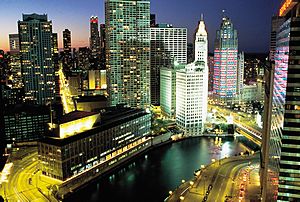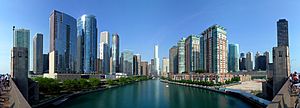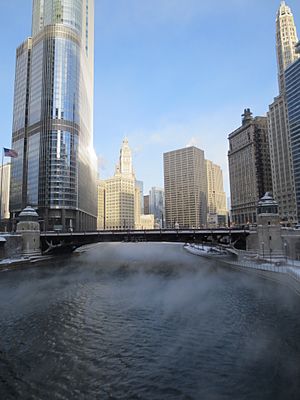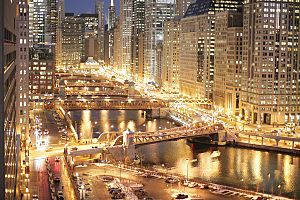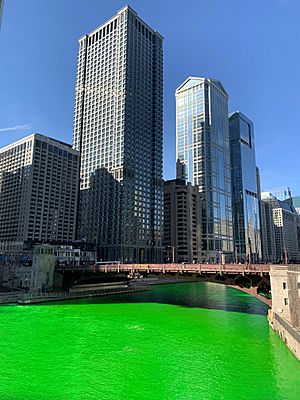Chicago River facts for kids
Quick facts for kids Chicago River |
|
|---|---|
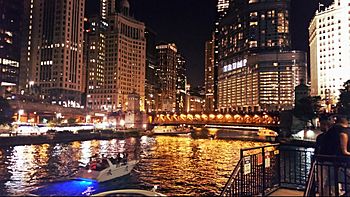
Chicago River at night in August 2015
|
|
| Country | United States |
| State | Illinois |
| City | Chicago |
| Physical characteristics | |
| Main source | Lake Michigan |
| Length | 156 mi (251 km) |
| Basin features | |
| Progression | Chicago River → South Branch → Chicago Sanitary and Ship Canal → Des Plaines River → Illinois River → Mississippi River → Gulf of Mexico |
| Tributaries |
|
The Chicago River flows for about 156 miles (251 km) right through the heart of Chicago, Illinois. Even though it's not the longest river, it played a huge role in making Chicago an important city. It connected the Great Lakes to the Mississippi Valley waterways. What makes this river truly special is that it's the only one in the world that was made to flow backwards by engineers!
Contents
History of the Chicago River
In the 1800s, engineers changed the direction of the Chicago River. They made it flow away from Lake Michigan and towards the Mississippi River basin. This big project, called the Chicago Sanitary and Ship Canal, helped keep the city's water clean.
The Chicago River is also famous for a fun tradition: it gets dyed green every year for St. Patrick's Day. The river is carefully managed so that boats and ships can travel through it safely.
The river is so important to Chicago that it's shown on the city's flag with two blue stripes. It also inspired a special Y-shaped symbol, called the municipal device. This symbol represents the river's three branches and can be seen on many buildings around Chicago.
The Main Stem of the River
The main part of the Chicago River, called the Main Stem, flows for about 1.5 miles (2.4 km). It goes west from Lake Michigan. Along its path, it passes under many bridges, like the Michigan Avenue Bridge and the Wells Street Bridge. It eventually meets the North Branch at a spot called Wolf Point.
Near McClurg Court, you can see the Nicholas J. Melas Centennial Fountain. This fountain was built in 1989 to celebrate 100 years of the Metropolitan Water Reclamation District. From May to October, it shoots a big arc of water over the river for ten minutes every hour.
In 2016, when the Chicago Cubs won the World Series, the river was dyed blue to celebrate their victory!
North Bank Landmarks
On the north side of the river, near the Michigan Avenue Bridge, is Pioneer Court. This spot marks where Jean Baptiste Point du Sable first settled in Chicago. He is known as the founder of Chicago. On the south side of the river is the historic site of Fort Dearborn. Many famous buildings are located around this area, including the NBC Tower, the Tribune Tower, and the Wrigley Building.
Central River Views
The river gently curves southwest between Michigan Avenue and State Street. Here, you can see impressive buildings like the Trump International Hotel and Tower, 35 East Wacker, and 330 North Wabash. As the river turns west again, it passes Marina City, the Reid, Murdoch & Co. Building, the Merchandise Mart, and 333 Wacker Drive.
Dyeing the Chicago River
St. Patrick's Day Tradition
For over fifty years, Chicago has had a special tradition: dyeing the river green for St. Patrick's Day. This usually happens on the Saturday closest to March 17th.
The tradition started by accident! Plumbers used a special dye called fluorescein to find illegal pollution. The local plumbers union still sponsors the dyeing today. At first, the EPA stopped the use of fluorescein because it could harm the river. So, the parade committee switched to a mix of forty pounds of powdered vegetable dye. They keep the exact recipe a secret, but they promise it's safe for the environment.
Not everyone loves the tradition. The environmental group Friends of the Chicago River thinks it makes the river look "lifeless and artificial." They believe the river should be seen as a natural resource, not just a decoration.
In 2009, First Lady Michelle Obama, who grew up in Chicago, was inspired by the river tradition. She asked for the White House fountains to be dyed green for St. Patrick's Day too!
Images for kids
-
Aerial view of the North Branch of the Chicago River, from the south, with Goose Island, near center
-
The Chicago 'L' Ravenswood train (Brown Line) crossing the north branch of the Chicago River
-
A view of the Chicago River from the South Branch, looking toward the main stem (right) and the North Branch (upper left) at Wolf Point
-
South Branch at Ping Tom Memorial Park
-
View from the U.S. Turning Basin towards the Chicago Loop
-
The Link Bridge of Lake Shore Drive
-
The river dyed green for Saint Patrick's Day in 2015
-
The river dyed blue during the Chicago Cubs' 2016 World Series celebration
See also
 In Spanish: Río Chicago para niños
In Spanish: Río Chicago para niños
 | Calvin Brent |
 | Walter T. Bailey |
 | Martha Cassell Thompson |
 | Alberta Jeannette Cassell |


